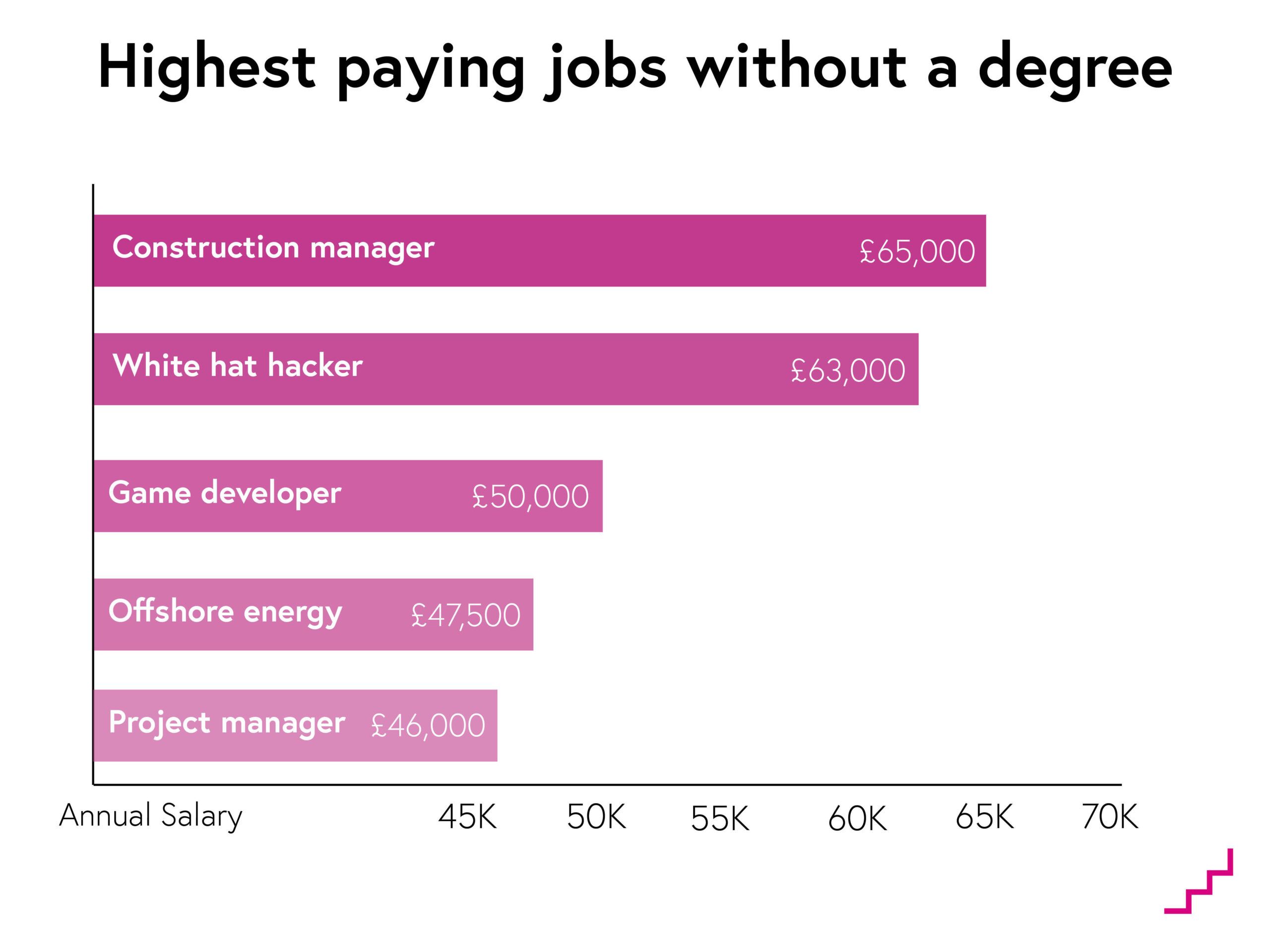Breaking Free from the Degree Requirement
The notion that high paying jobs require a college degree is a common misconception that can be limiting for many individuals. While a degree can certainly provide a foundation for a successful career, it is not the only path to achieving financial stability and personal fulfillment. In fact, many lucrative career paths do not necessitate a degree, and exploring these options can be a liberating experience for those who feel constrained by the traditional education system.
One of the primary benefits of pursuing low stress high paying jobs without a degree is the potential for increased earning potential without the burden of student loan debt. According to the Bureau of Labor Statistics, many high paying jobs in the trades, technology, and creative fields do not require a degree, and can provide salaries ranging from $50,000 to over $100,000 per year. Additionally, these careers often offer opportunities for advancement and professional growth, allowing individuals to increase their earning potential over time.
Furthermore, pursuing a career without a degree can also provide a sense of autonomy and independence. Without the burden of student loan debt, individuals can focus on building their skills and experience, and can often enter the workforce more quickly than their degree-holding counterparts. This can be particularly appealing for those who value flexibility and freedom in their careers.
Of course, it’s worth noting that while a degree may not be required for these careers, having one can still be beneficial. Many employers place a high value on education, and having a degree can provide a competitive edge in the job market. However, for those who are unable or unwilling to pursue a degree, there are still many opportunities for success and financial stability.
What Makes a Job Low Stress?
A low stress job is one that allows individuals to work in a calm and peaceful environment, free from excessive pressure and anxiety. While some level of stress is inevitable in any career, low stress jobs are those that prioritize employee well-being and provide a healthy work-life balance. In a low stress job, individuals are able to focus on their work without feeling overwhelmed or burnt out.
There are several key factors that contribute to a job being considered low stress. These include a manageable workload, a supportive work environment, and a sense of control and autonomy. When individuals feel in control of their work and are able to make decisions without excessive supervision, they are more likely to feel calm and confident. Additionally, a low stress job is one that provides opportunities for growth and development, without placing undue pressure on employees to perform.
The benefits of working in a low stress environment are numerous. For one, it can have a positive impact on physical health, reducing the risk of stress-related illnesses such as heart disease and diabetes. Additionally, low stress jobs can improve mental health, reducing the risk of anxiety and depression. When individuals are able to work in a calm and peaceful environment, they are more likely to feel happy and fulfilled, both in and out of the workplace.
In the context of low stress high paying jobs without a degree, it’s essential to consider the stress levels associated with different careers. While some high paying jobs may be stressful, there are many that offer a low stress environment and a high level of job satisfaction. By prioritizing employee well-being and providing a healthy work-life balance, these careers can offer a sense of calm and fulfillment that is hard to find in more stressful professions.
High Paying Jobs in the Trades
One of the most lucrative and in-demand career paths that don’t require a degree is in the trades. Electricians, plumbers, and HVAC technicians are just a few examples of high paying jobs in the trades that can provide a low stress work environment and a high level of job satisfaction. These careers typically require a vocational training program or an apprenticeship, and can offer salaries ranging from $50,000 to over $100,000 per year.
Electricians, for example, are in high demand due to the increasing need for electrical infrastructure in both residential and commercial settings. According to the Bureau of Labor Statistics, the median annual salary for electricians is around $55,000, with top earners making over $90,000 per year. Additionally, electricians can work in a variety of settings, from construction sites to residential homes, and can often choose their own schedules and work at their own pace.
Plumbers are another example of a high paying job in the trades that can offer a low stress work environment. Plumbers install, maintain, and repair pipes, fixtures, and appliances that are connected to water and gas systems. According to the Bureau of Labor Statistics, the median annual salary for plumbers is around $50,000, with top earners making over $80,000 per year. Plumbers can work in a variety of settings, from residential homes to commercial buildings, and can often work independently or as part of a team.
HVAC technicians are also in high demand due to the increasing need for heating and cooling systems in both residential and commercial settings. According to the Bureau of Labor Statistics, the median annual salary for HVAC technicians is around $45,000, with top earners making over $70,000 per year. HVAC technicians can work in a variety of settings, from construction sites to residential homes, and can often choose their own schedules and work at their own pace.
These high paying jobs in the trades offer a low stress work environment and a high level of job satisfaction, making them an attractive option for those looking for low stress high paying jobs without a degree. By pursuing a career in the trades, individuals can earn a good income, work in a variety of settings, and enjoy a sense of autonomy and independence.
Low Stress Careers in Technology
Technology is a rapidly growing field that offers a wide range of low stress high paying jobs without a degree. Web development, data analysis, and cybersecurity are just a few examples of careers that can provide a high level of job satisfaction and financial stability. These careers typically require specialized training or certifications, but can offer salaries ranging from $60,000 to over $120,000 per year.
Web development is a low stress career that involves designing and building websites, applications, and other online platforms. Web developers can work as freelancers or as part of a team, and can often choose their own schedules and work at their own pace. According to the Bureau of Labor Statistics, the median annual salary for web developers is around $67,000, with top earners making over $110,000 per year.
Data analysis is another low stress career in technology that involves working with data to identify trends and patterns. Data analysts can work in a variety of industries, from finance to healthcare, and can often work independently or as part of a team. According to the Bureau of Labor Statistics, the median annual salary for data analysts is around $60,000, with top earners making over $100,000 per year.
Cybersecurity is a rapidly growing field that involves protecting computer systems and networks from cyber threats. Cybersecurity specialists can work in a variety of industries, from finance to government, and can often work independently or as part of a team. According to the Bureau of Labor Statistics, the median annual salary for cybersecurity specialists is around $70,000, with top earners making over $120,000 per year.
These low stress careers in technology offer a high level of job satisfaction and financial stability, making them an attractive option for those looking for low stress high paying jobs without a degree. By pursuing a career in technology, individuals can earn a good income, work in a variety of settings, and enjoy a sense of autonomy and independence.
How to Get Started in a Low Stress High Paying Career
Getting started in a low stress high paying career without a degree requires some planning and effort, but it can be a rewarding and lucrative path. Here are some practical tips to help you get started:
First, identify your skills and interests. What are you good at? What do you enjoy doing? Consider how your skills and interests can be applied to a low stress high paying career. For example, if you’re good with computers, you might consider a career in web development or data analysis.
Next, research training programs and certifications that can help you get started in your chosen career. Many community colleges and vocational schools offer training programs in fields such as technology, healthcare, and the trades. You can also consider online courses and certifications, such as those offered by Coursera or Udemy.
Building a professional network is also important. Attend industry events and conferences, join online communities and forums, and connect with people in your field on LinkedIn. This can help you learn about job opportunities and get advice from experienced professionals.
Creating a strong portfolio is also essential. This can include examples of your work, such as projects you’ve completed or certifications you’ve earned. Having a strong portfolio can help you stand out to potential employers and demonstrate your skills and abilities.
Finally, be proactive and persistent. It may take some time to land a job in a low stress high paying career, but with hard work and determination, you can achieve your goals. Consider volunteering or taking on part-time work to gain experience and build your skills.
By following these tips, you can get started in a low stress high paying career without a degree. Remember to stay focused, work hard, and be open to learning and growth. With the right mindset and skills, you can achieve financial freedom and personal fulfillment in a low stress high paying career.
Overcoming the Stigma of Not Having a Degree
One of the biggest obstacles to pursuing a low stress high paying career without a degree is the stigma associated with not having a degree. Many people believe that a degree is necessary for success, and that those without a degree are somehow less capable or less deserving of high paying careers.
However, this stigma is not supported by the facts. Many successful individuals have achieved high paying careers without a degree, and have gone on to thrive in their chosen fields. For example, entrepreneurs like Steve Jobs and Richard Branson did not have degrees, but were able to build successful businesses and achieve great success.
In addition, many low stress high paying careers do not require a degree. Careers in the trades, technology, and creative fields often place more emphasis on skills and experience than on formal education. This means that individuals without a degree can still pursue these careers and achieve success.
It’s also worth noting that having a degree does not guarantee success. Many people with degrees struggle to find work or achieve financial stability, while those without degrees may be able to find success through hard work and determination.
Ultimately, the key to overcoming the stigma of not having a degree is to focus on building skills and experience, and to pursue careers that align with your interests and strengths. By doing so, you can achieve success and financial stability, regardless of whether or not you have a degree.
As one successful entrepreneur without a degree noted, “I didn’t let not having a degree hold me back. I focused on building my skills and experience, and I was able to achieve great success. I believe that anyone can do the same, regardless of their educational background.”
Creating a Work-Life Balance in a Low Stress Career
Achieving a work-life balance is essential for maintaining a low stress career. When you’re able to balance your work and personal life, you’re better able to manage stress and maintain your overall well-being. Here are some tips for creating a work-life balance in a low stress career:
Set boundaries: One of the most important things you can do to create a work-life balance is to set boundaries between your work and personal life. This means establishing clear boundaries around your work hours, avoiding work-related activities during your personal time, and prioritizing self-care.
Prioritize self-care: Taking care of your physical and mental health is essential for maintaining a low stress career. Make sure to prioritize self-care activities such as exercise, meditation, and spending time with loved ones.
Learn to say no: Don’t be afraid to say no to requests that are not aligned with your priorities or that interfere with your personal time. Remember, taking on too much can lead to burnout and stress.
Take breaks: Taking regular breaks throughout the day can help you stay focused and productive. Make sure to take time off when you need it, and prioritize relaxation and rejuvenation.
Seek support: Having a support system in place can be incredibly helpful in maintaining a work-life balance. Seek out friends, family, or a therapist who can provide emotional support and help you navigate challenging situations.
By following these tips, you can create a work-life balance that supports your low stress career and overall well-being. Remember, taking care of yourself is essential for achieving success and happiness in your career.
Conclusion: Unlocking Your Earning Potential Without a Degree
In conclusion, there are many low stress high paying jobs without a degree that can provide financial freedom and personal fulfillment. By exploring these options, individuals can break free from the degree requirement and achieve success in their chosen careers.
As we’ve discussed, there are many lucrative career paths that don’t necessitate a degree, including high paying jobs in the trades, low stress careers in technology, and more. By considering these options, individuals can unlock their earning potential and achieve financial stability without the burden of student loan debt.
Additionally, we’ve emphasized the importance of achieving a work-life balance in a low stress career. By prioritizing self-care, setting boundaries, and maintaining a healthy work-life balance, individuals can reduce stress and improve their overall well-being.
Finally, we’ve addressed the potential stigma associated with not having a degree and provided reassurance that many successful individuals have achieved high paying careers without one. By sharing inspiring stories of people who have thrived in low stress high paying careers, we hope to encourage readers to explore these options and achieve their own success.
In summary, low stress high paying jobs without a degree are a viable option for individuals looking to achieve financial freedom and personal fulfillment. By exploring these options, prioritizing self-care, and maintaining a healthy work-life balance, individuals can unlock their earning potential and achieve success in their chosen careers.







/https://blogs-images.forbes.com/niallmccarthy/files/2017/07/20170725_Best_Paid_Jobs.jpg)